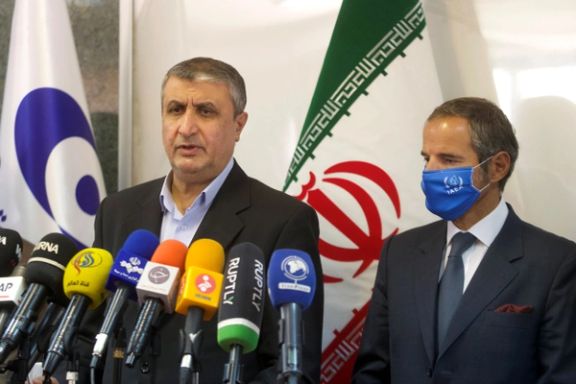IAEA Strikes Deal With Iran On Replacing Cameras At Nuclear Site

The UN nuclear watchdog reached a deal with Iran on replacing its cameras at a nuclear workshop, easing a months-long standoff impacting wider nuclear talks.

The UN nuclear watchdog reached a deal with Iran on replacing its cameras at a nuclear workshop, easing a months-long standoff impacting wider nuclear talks.
Those wider, indirect talks between Iran and the United States on salvaging the 2015 Iran nuclear deal are deadlocked, but Washington had threatened to confront Tehran at the International Atomic Energy Agency's 35-nation Board of Governors if it did not relent on allowing monitoring at a facility in Karaj, west of Tehran this month.
Any such confrontation could have caused the collapse of the talks altogether, diplomats said.
"The agreement with Iran on replacing surveillance cameras at the Karaj facility is an important development for the IAEA's verification and monitoring activities in Iran," the IAEA said in a statement after diplomats told Reuters an agreement had been reached.
"It will enable us to resume necessary continuity of knowledge at this facility," the IAEA said, adding the new cameras would be installed "in coming days".
At the same time, IAEA chief Rafael Grossi told AP on Tuesday that Iran's "level of enrichment is one that requires an intense verification effort to make sure that the material is where it must be".
He warned that the restrictions faced by his inspectors in Iran threaten to give the world only a "very blurred image" of Tehran's program as it enriches uranium closer than ever to weapons-grade levels.
Iranian media insisted that the footage from the camera will not be shared with IAEA and remain with Iran, based on limitations Tehran imposed earlier this year on all IAEA monitoring.
Iran limited monitoring access by the IAEA at its nuclear facilities in February and later refused to allow the replacement of cameras at the Karaj facility that manufactures uranium enrichment centrifuges. Just on Tuesday the head of Iran’s Atomic Energy Organization, Mohammad Eslami, had said Tehran would not allow access to the Karaj facility, which was the target of a drone attack in June.
The news came as the three European countries, the United Kingdom, France and Germany, signatories of the 2015 nuclear agreement with Iran, repeatedly criticized Tehran in recent days for being inflexible in talks aimed at restoring the JCPOA and making “maximalist” demands.
One of the IAEA's four cameras at the workshop in the TESA Karaj complex was destroyed in an apparent sabotage attack in June that Iran blamed on Israel. Iran then removed the cameras and has not let the IAEA return to replace them, angering the United States and its allies.
Iranian media said Wednesday that IAEA has agreed to condemn “the terrorist attack” against the Karaj facility.
Iran has shown the IAEA the cameras and "data storage media" containing their footage, except for the one containing the destroyed camera's footage. The IAEA and Western powers have called on Iran to explain where it is.
The bigger the gap in knowledge of what happened at Karaj, the greater the concern among Western states will be that Iran has secretly siphoned off key parts for centrifuges, machines that enrich uranium.
A senior diplomat said last month the IAEA does not know whether Karaj is operational.
With Reporting by Reuters and AP